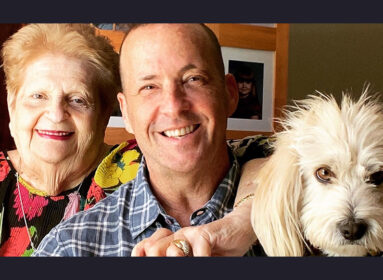 The Jewish state celebrates the year of the woman
The Jewish state celebrates the year of the woman
By Deborah Fineblum/JNS.org

Israeli tennis player Shahar Pe’er competes at the Citi Open in July 2011.
Credit: Keith Allison via Wikimedia Commons.
How is the Jewish state’s 66th birthday celebration different from all other years’ celebrations? Special plans are afoot to recognize the achievements of Israeli women.
On May 5, the theme of the ceremony kicking off the back-to-back Israeli Memorial Day and Independence Day events on Mount Herzl is “The Era of Women—Achievements and Challenges.” Independence Day torches, featured annually at the official state ceremony, will be lit exclusively by women at this year’s event.
Israeli Culture and Sport Minister Limor Livnat introduced the government’s year-long focus on the achievements and challenges of today’s Israeli woman, in recognition of those women who have made significant contributions to both the State and to Israeli society as a whole in the arenas of science, culture, economy, defense, women’s rights, education, business, hi-tech, the environment, and social activism.
“The time has come that the state and society will put women at the center and give them the national stage,” Livnat said in a statement.
Though all Israeli women are included in the government’s Independence Day salute, 14 notable women have been singled out for special recognition as ceremonial torchbearers:
• Maj. Gen. Orna Barbivai, who, as head of the Israel Defense Forces Manpower Directorate, is the Israeli army’s highest-ranking woman.
• Adina Bar-Shalom, who was recently tapped for the Israel Prize for her “pioneering work to bridge societal rifts and socioeconomic gaps and to promote an ultra-Orthodox lifestyle that includes social openness and higher education.”
• Actress Miriam Zohar, who also received the Israel Prize in 1986.
• Kira Radinsky, for her pioneering work in the field of web dynamics at the Technion – Israel Institute of Technology.
• Belaynesh Zevadia, the Israeli ambassador to Ethiopia.
• Carmela Menashe, military affairs reporter for Army Radio.
• Hindia Suleiman, who founded an initiative to empower the women of Bu’eina-Nujeidat, an Israeli Arab village.
• Tali Peretz-Cohen, whose rape crisis center comes to the aid of victims of sexual assault in the Galilee and the Golan.
• Maxine Fassberg, CEO of Intel Israel and a leader of Israel’s burgeoning hi-tech industry.
• Miriam Peretz, whose two sons were Israeli army officers killed in the line of duty in the Gaza Strip and in Lebanon.
• Shahar Pe’er, a teenaged Israeli tennis star currently ranked 11th in the world, who is lighting a torch with Paralympics handcyclist Pascale Noa Bercovitch.
• Geula Cohen, a former member of the Knesset, who will light a torch together with Gal Yoseph, chairwoman of Israel’s National Students Council.
The 14 torchbearers were selected by the members of a special committee charged to select women of great accomplishment from across Israel’s diverse population, what Livnat referred to as representing “a unique mosaic of Israeli society.” And that they did. But other Israeli women interviewed by JNS.org have their own ideas of who should have made the list. Among them:
• Karnit Flug, current governor of the Bank of Israel, the country’s central bank, was “nominated” by Chana Port of Beit Shemesh.
• Jerusalem Post columnist Caroline Glick, whose outspoken political analysis shakes Israelis out of their complacency, said Raanana’s Etta Korenman.
• Supermodel Bar Refaeli, who, said Sofie Rousseau of Kfar Saba, is a stalwart defender of Israel wherever her international career takes her.
• Rabbanit Chana Henkin, educator and innovator of the Yoetzet Halacha program, which trains and empowers women to give advice on matters of family and women’s health, suggested Tzilia Sacharow of Jerusalem.
• Bestselling Iranian-born Israeli pop singer Rita, who is “talented, charismatic, and creative,” according to Shelly Margalit, who lives on a kibbutz near Petach Tikva. Gabie Sykora of Ra’anana believes that every wife and mother of every soldier should be nominated. She currently has a son and a daughter in the Israel Defense Forces. “Behind nearly every holy chayal/chayelet (male and female soldier),” she told JNS.org, “there’s a mom or wife doing their horrendously smelling laundry, getting food ready to stuff them with or send back with them, and trying her darndest not to worry and to keep smiling.”
Yom HaZikaron Israel Memorial Day
Israeli families discuss what it means to lose a soldier, a son, a sibling
By Maayan Jaffe/JNS.org
Some 22,000 Israeli soldiers have died since the establishment of the Jewish state, including 40 soldiers between March 2013 and March 2014, according to the Israel Defense Forces.
“We in Israel are fighting — and dying — on behalf of every Jew in the world. … We are maintaining a safe haven for every Jew to escape to. Jews in the Diaspora live safer lives and hold their heads higher because Israel and its army exist,” said Chantal Belzberg, executive vice chairman of OneFamily, an organization dedicated to the rehabilitation of Israeli victims of terror attacks and their families.
On Yom HaZikaron, the fourth day of the Hebrew month of Iyar (sundown on May 4), Israelis will pay tribute to the country’s fallen soldiers in a solemn day of mourning. On its official Memorial Day, Israel also mourns the loss of civilians who were killed as a result of terrorism.

Family members of Staff-Sgt. Gavriel Kobi mourn at his funeral in Haifa. The 20-year-old IDF soldier was shot and killed by a terrorist in Hebron on Sept. 22, 2013. Credit: EPA
Among the soldiers killed during these past 12 months was 20-year-old Gavriel Kobi, a combat soldier in the Givati Brigade, who was shot and killed on Sept. 22, 2013 by a Palestinian sniper while on guard duty outside Hebron’s Cave of the Patriarchs. Also killed were 18-year-old Eden Atias, stabbed in the neck on Nov. 11, 2013 while on a bus in the northern Israeli city of Afula, and 31-year-old Shlomo Cohen, a Petty Officer 1st Class in the Israeli Navy, who was fatally shot by a Lebanese sniper while driving near the Israel-Lebanon border fence in an unarmored military vehicle. Cohen was on operational duty on Dec. 15, 2013 at the time of his death.
OneFamily’s Belzberg said that when a young soldier is killed, it has a “radically shocking, traumatic and debilitating” effect on the soldier’s parents and family.
“Siblings suffer tremendously, but not as deeply as a mother losing her son, the son she bore, nursed, dressed, walked to school, took to his school’s football practice and whose game she watched proudly,” Belzberg told JNS.org. “Siblings suffer because they don’t just lose a brother; they also lose their mom and dad. … They wallow in their grief and have no energy to care for the living. The dead child occupies a lot more time than a living one.”
Yehudit Rotenberg, whose son Sgt. Nadav Rotenberg, 20, was killed January 7, 2011 by a stray Israel Defense Forces mortar shell in an incident near the Gaza border, still remembers the day she learned of her son’s death. The family had seen a report on a border incident in which four soldiers were injured.
“It was a Friday night,” Rotenberg recalled. “We learned of the incident at around 6:10 p.m. I was worried, but I didn’t believe he could have died. They said there were injuries on the news. Eating Shabbat dinner was very stressful; it was hard to eat the food. … We kept thinking he would call, that he would tell us he was OK. … Then there was a knock at the door, and we saw an army uniform collar through the window.”
She said the hardship, the emotion, came quickly.

IDF Cpl. Netanel Yahalomi, 20, who was killed on Sept. 21, 2012 while on patrol along the Israeli border with Egypt. Credit: EPA
Avital Yahalomi has a similar story. Her brother, 20-year-old Cpl. Netanel Yahalomi, was killed on Sept. 21, 2012 while on patrol along the Israeli border with Egypt. Three heavily armed terrorists attempting to infiltrate Israel attacked the soldiers. One terrorist was wearing a suicide belt, which went off during the battle.
Cpl. Yahalomi was a deeply religious solider and a Zionist; three Jewish books were found on his body after his death. His sister, Avital, told JNS.org that her brother dreamed of being the strongest and best combat soldier. He was upset when he learned that because he wore glasses, which reduced his profile, he could not join the unit of his choice, but instead would be part of the Artillery Corps. This knowledge, however, put his family more at ease. They knew he was on the Egyptian border, but they assumed that he was safe there.
“In general, we have peace with Egypt,” Avital said, noting that her brother was careful about what he told the family, never wanting to worry them.
On the afternoon of Cpl. Yahalomi’s death, his family was preparing for Shabbat at their home in Nof Ayalon, near Modi’in, when an IDF representative came to deliver the news. “We all just sat on the couch and we cried and cried,” she said. “This is something that never goes away. It will never go away.”
“When you say goodbye to your son as he gets on the bus with all of the new soldiers, you’ve offered up your son as a potential sacrifice to the country,” explained Belzberg. “Your heart sinks. The worst may happen. But most parents say to themselves, ‘It won’t happen to me.’”
She added, “Then, in the middle of the night, there’s a knock at the door. … Three soldiers stare sadly into your eyes. Your worst nightmare has happened. Your son is dead. You scream and your whole body shakes. You collapse.”
But you have no choice except to go on. Today, Nadav Rotenberg’s younger brother is in his second year in the army. The first year, said Yehudit Rotenberg, “I worried a lot.” Yet she is also very proud. “These are brave children,” said Rotenberg. “Even though I lost a child, I still believe the army is very important and we have to support it.”
Avital Yahalomi has similar ideas. “I am happy to be Israeli, even though it cost me so much. … I plan to stay here, to raise my children here, to send them to the army to defend my country,” she said.
“Yom HaZikaron is about remembering a larger family, about saying to each bereaved family that their child, the apple of their eye, is remembered,” said Rebecca Fuhrman, manager of marketing and communications for OneFamily. “Their loss is our loss.”
For a full listing of soldiers (in Hebrew) who died between last Yom HaZikaron and this one, visit www.izkor.gov.il/Sipurim_Search.aspx.
For a list of soldiers and victims of terror killed in 2013, visit www.jewishvirtuallibrary.org/jsource/Terrorism/victims.html#2013.
Maayan Jaffe is a freelance writer in Overland Park, Kan. She can be reached at maayanjaffe@icloud.com.








 Southern New England Jewish Ledger
Southern New England Jewish Ledger








